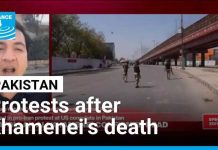
Two suicide bombers breached a high-security paramilitary HQ in Pakistan, exposing vulnerabilities in the nation’s defense against relentless insurgent threats.
Story Snapshot
- Suicide bombers attacked Pakistan’s Federal Constabulary HQ in Peshawar, killing three.
- The attack involved firearms and explosives, highlighting security challenges.
- No group has claimed responsibility for this high-profile assault.
- The incident underscores the ongoing threat from militant groups in the region.
The Attack Unfolds
On November 24, 2025, the tranquility of a typical morning in Peshawar was shattered by gunfire and explosions at the Federal Constabulary headquarters. At 8:11 AM, attackers arrived at the gate, initiating a violent assault by opening fire on guards. The attackers forced their way into the compound, where they detonated explosives, resulting in the tragic deaths of three paramilitary personnel and injuries to five others. The violence was contained thanks to the swift response of security forces that neutralized the attackers before further damage could be done.
This attack, reminiscent of previous ones in the region, signals a grave reminder of the persistent threat posed by militant groups in northwest Pakistan. Peshawar, a city near strategic military installations, has seen its share of violence, and this event highlights the attackers’ determination to strike at the core of Pakistan’s security apparatus. No group has yet claimed responsibility, a fact which adds to the mystery and concern surrounding the incident.
A History of Violence
Pakistan’s northwest, particularly Khyber Pakhtunkhwa and its tribal areas, has long been a battleground for militant activities. Groups like the Tehrik-i-Taliban Pakistan (TTP) have operated in these regions, often targeting security forces. The Federal Constabulary, tasked with maintaining order and countering insurgency, has faced numerous attacks over the years. The resurgence of militant activity, especially following the Taliban’s return to power in Afghanistan in 2021, has emboldened extremist groups, leading to a spike in attacks like the one in Peshawar.
In September 2025, a similar attack occurred in Quetta, where a bombing at another paramilitary HQ resulted in significant casualties. These incidents illustrate the ongoing challenge faced by Pakistani security forces in safeguarding urban centers and maintaining order in a region fraught with instability.
Stakeholders and Motivations
The primary stakeholders in this unfolding drama include the Federal Constabulary and other Pakistani security forces who are on the frontline against insurgency. Their role is critical in maintaining order and protecting urban centers against militant threats. On the other side, militant groups aim to destabilize state authority, retaliate against security operations, and gain publicity for their causes. The Pakistani government, under immense pressure, must restore public confidence, demonstrate control, and prevent future attacks.
The power dynamics in this scenario are complex, with security forces constantly under threat from well-organized militant networks. The government relies heavily on these forces for counter-terror operations, while militant groups exploit regional instability and porous borders to advance their agendas.
Current Developments and Impact
In the immediate aftermath of the attack, security forces sealed the area and launched an investigation. Funeral prayers for the slain personnel were held later that day, marking a somber moment for their families and colleagues. No group has claimed responsibility for the attack, leaving a cloud of uncertainty over its motivations and perpetrators. In response, security has been heightened in Peshawar and other major cities to prevent further incidents.
The attack has immediate and long-term implications for Pakistan. In the short term, there will be heightened security measures, increased patrols, and possible retaliatory operations. Long-term effects could include an erosion of public confidence in security measures, an escalation of militant attacks, and increased strain on security resources. The broader implications for the region include disruptions to daily life and commerce, political pressure on the government to enhance security, and potential impacts on investment and development.
Sources:
Wikipedia: September 2025 Quetta bombing







